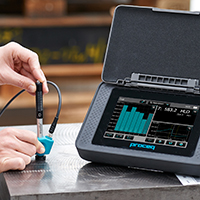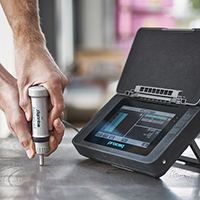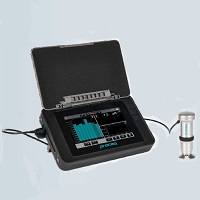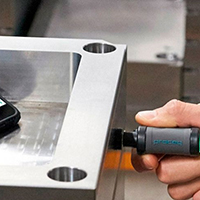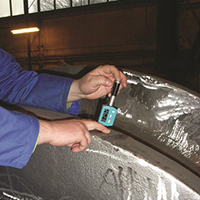Hardness Testing
Equotip 550 Leeb
Equotip 550 UCI
Equotip 550 Rockwell
Leeb Live
Equotip UCI Live
Piccolo and Bambino
PCTE's Hardness Testing Equipment
Hardness testing is defined as the ability to indent a metal. This form of testing is generally used to indicate the wear properties, heat treatment or strength of a metal. Traditionally the measurement has been carried out using a benchtop test system. There is a range of testing scales for hardness dependent on the indenter shape and force applied (i.e. Rockwell, Brinell etc).
The Equotip is a portable metal hardness testing device which makes use of the Leeb testing technique whereby the indenter is bounced off the test piece surface using a spring-loaded mechanism. The Leeb hardness is the relative velocity of the indenter before and after the impact. Leeb hardness testing can then be converted using calibration curves to other scales, such as Rockwell. The advantage of the system being portable is that the testing machine can go to the element rather than the element going to the testing machine (which could be quite large and heavy).
Over time additional hardness testing methods have been added to the Equotip. The Equotip Rockwell system uses a small static Rockwell indenter and the pressure from the user’s hand to measure hardness. Alternatively, the Equotip UCI use the ultrasonic frequency variation of a portable probe forced against the surface to estimate hardness.
Further improvements to Equotip testing machines have been the introduction of Live systems. These are cloud based systems that make use of an Apple mobile device (iPad or iPhone). The hardness indenter/probe is wirelessly linked to the platform and an app run on the device during testing. The advantage of the Live system is the ability to share data, increased portability update firmware quickly and increasing test speeds. Portable, lightweight and highly accurate, the Equotip is the leader in hardness testing.
Video: An Overview of Hardness Testing With Warren Villarosa





